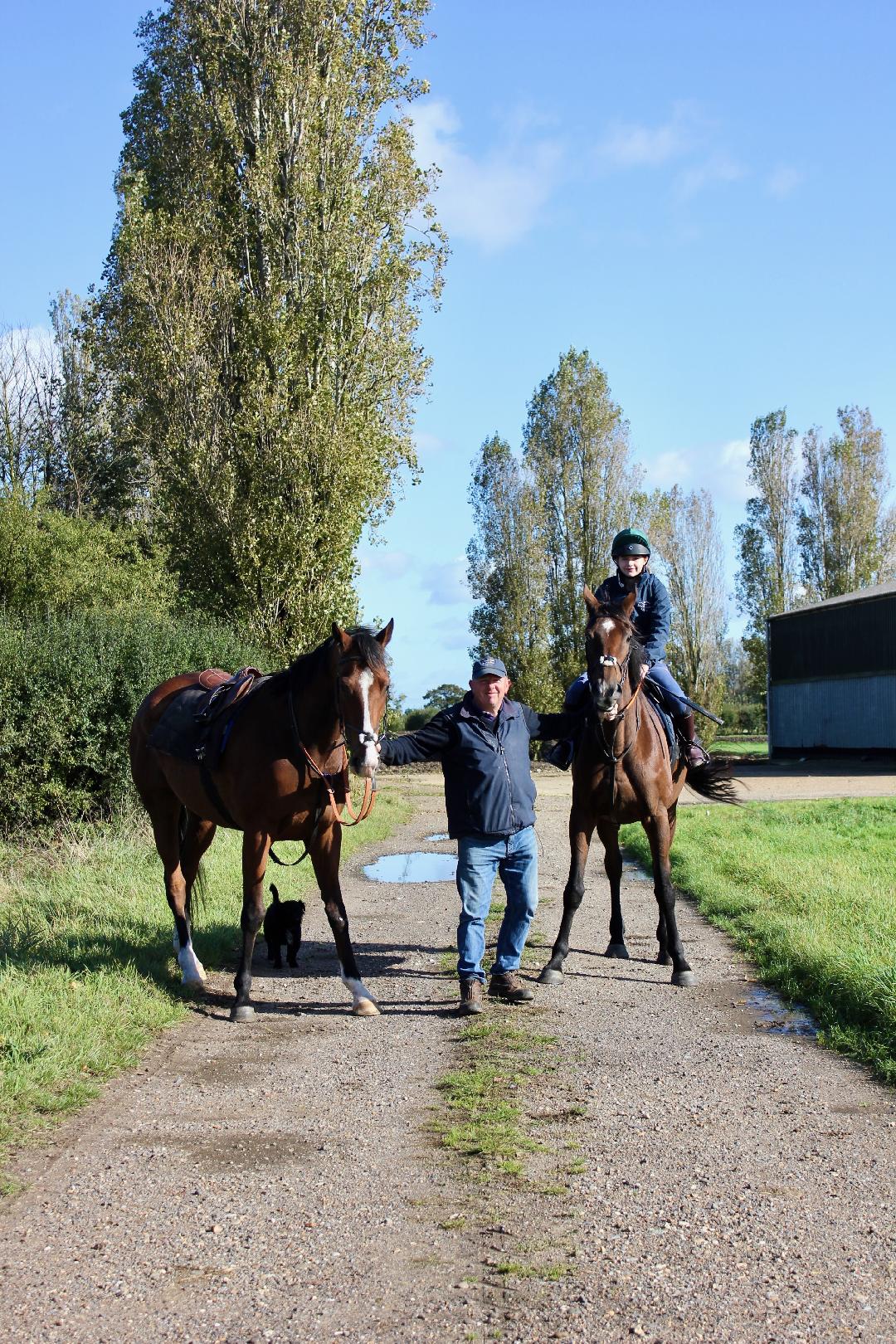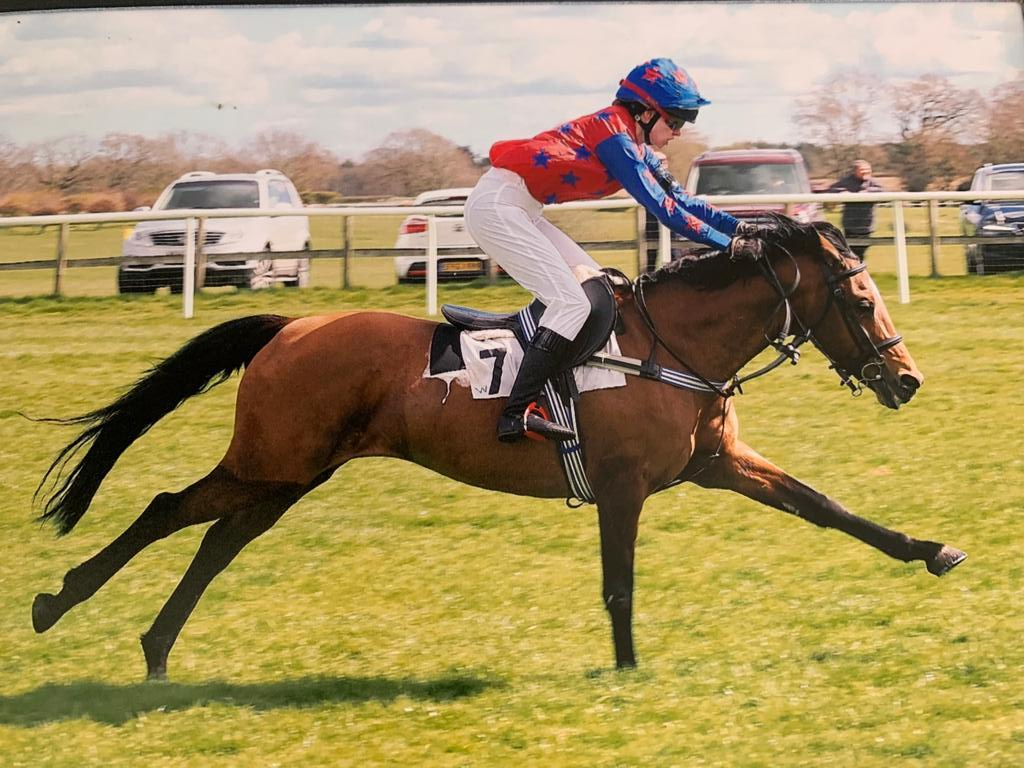TRAINER TALK: DAVID BINGHAM
By Jake Exelby

David Bingham with his daughter Sophie
David Bingham is a newcomer to the ranks of pointing trainers, having saddled his first runners last season and achieving three placings from General Custard, one of just three horses in his Poplar Farm, East Suffolk yard,. This year, he has expanded his string – hoping to run half a dozen – and, obviously, to celebrate his maiden success. It is fair to say that David – who has a background in sports science and medicine – has come to point-to-pointing via an unconventional route, as a self-confessed ‘failed footballer’ who was physio at Wigan Athletic and Ipswich Town, ran a chain of 40 sport rehabilitation centres and then set-up an elite sport insurance company dealing mainly with Premier League and Champions League football clubs. Jake Exelby went to find out more, with the obvious first question: why and how did you get involved with pointing?
“It’s an itch that needed scratching,” laughs David. “When I was a physio, my partner had a horse, so I learnt to ride. Both my daughters ride, so I got into hunting. And because I’ve always been interested in horses, I’ve always had a desire to train. There are lots of things that I can bring from the football world to the equine one although,” he confesses, “It’s an experiment and not everything might work!”
“I’m doing it because I want to get a full licence eventually,” he confirms. “There are two ways to do it – either be an assistant trainer or have fifty pointing runners and five winners, so I’ve chosen the latter. I’ll probably get a dual licence – while I prefer jump racing, this is Newmarket after all. David cites his reasons for wanting to train professionally as, “To test myself against the best and get to the top level. I reckon I’ve got 10-15 years of innovation before it catches up with me!”
So does David agree with the increasing professionalism of pointing, and think we should allow rules trainers to run in certain races? “As a point-to-point keeper, I don’t want to run against the pros. The size we are, it’s hard going up against them,” he admits, “Although I might change my mind when I take out a licence! It’s not fair to let them run in points – they can take us on in Hunter Chases. And why,” he asks rhetorically, “Would they want to go pointing other than as a schooling ground?”
“I see training horses as a blend of science and art – that’s why my business is called Scart Equine – and, like British cycling, it’s all about marginal gains,” responds David when I ask what he has brought from his sports science background to training pointers. “Take these racing colours – they’re not silk like normal ones, but lycra, which is more aerodynamic and, ultimately, makes a difference.”
“Diet is another factor,” continues David. “Most horses have breakfast, lunch and dinner but I feed mine throughout their daily cycle, which – scientifically – is the way they should be fed as, in nature, they’re out grazing every day. Horses are like radiators – to keep them constantly warm, you need to feed them constantly too.” Another potential marginal gain is the time of day he trains his horses. “Most horses do their work at the crack of dawn, then go to sleep,” says David. “But they’re athletes and should be training at the time they compete. Horses race in the afternoon, when they’re normally asleep in their box, not early in the morning. I don’t do things just because they’ve always been done that way.”
“While I check the weight,” David tells me, “Which is a good indication of the horse’s state of hydration, I’m more bothered about the fat percentage. But monitoring everything gives you an idea of what’s good and bad.” It’s not unusual for trainers to check their charges’ heart rates, but David takes this a stage further, doing it every session and reviewing the data. He is also probably unique among pointing trainers in having his own racing manager, Rees Dyke, a data analyst who previously worked in French rugby. “I’ve got limited knowledge of the trainers, jockeys, horses and tracks,” admits David. “Rees knows a lot more”.
He shows me some of his data on a screen. “I use a French company called Arioneo,” David explains. “I compare every session to the previous week, and it shows the correlation between a horse’s stride pattern at the start and end of the session. Recovery rate is another big thing for me, along with their average workload ratio, which makes sure the horses are working hard enough, with an active recovery. There’s a big debate in sport about how much time you have between matches. It’s the same for horses – are they training hard enough? Only about half a dozen rules trainers use it, and no other pointing keepers.”
“Finally,” David concludes his lesson on applying science to his horses, “I work with sports scientist Joe Dunbar on saliva testing to see how stressed and stimulated they are – horses with chronic stress, such as ulcers, produce lower levels of cortisol.”
David’s 16-year-old daughter Sophie tells me her story. “I’ve been riding since I was four, first on hunting ponies, then showjumping, and most recently pony racing. I rode for three seasons and didn’t ride a winner but had three placings and rode at several rules courses, including Ascot. I’m hoping to get my point-to-point licence soon and have my first ride at Higham in February, if not before.”

Sophie Bingham in pony race action
“Sophie’s pony racing gave us a good grounding,” adds David. “We used a heart rate monitor for her first race, which gave us great data. However, next time out, she was having her kit inspected and someone said, ‘What’s this? I’m not sure it’s allowed,’ so we had to take it off. I then got a long letter from the Pony Racing Authority telling me why I couldn’t use one, even though there’s nothing in the rules against it! I see pony racing as a natural step to pointing and I think the link between the two should be closer. And I’d love to run a pointer in a heart rate monitor too.”
Among other things David would like to see in pointing is a reduction in the cost of the Hunter Certificate. “£300 is a lot to pay if you only run once or twice, and your first ever race is a massive expense. Is there a way that you could buy a book of tickets – like you used to for hunting – for, say £100 each, so you only pay the full fee after three runs? And if racing’s off, you don’t always get your £50 entry fee back – what other sport does that? I’m sympathetic to the cost of putting on a meeting,” David goes on, “But is there a way to fund it centrally. Hunting’s in decline so rather than rely on the goodwill of individual hunts, have events organized centrally by racing clubs. We mustn’t let pointing die – it’s such a good breeding ground, for horses, jockeys, trainers…”
David uses a football comparison to underline his point. “If you insure the sport and buy everything centrally, it would be significantly cheaper. The big mistake the Premier League made initially was not owning their broadcasting rights – in American football, the NFL owned everything, so they could divide it equally. I take the same scientific approach to my football insurance business, basing the players’ valuation on nine objective facts – like international record, injuries, assists, goals and their position. For example, left-sided players are worth more than right-sided.”
It’s not just the horses that benefit from David’s scientific methods. “We have Zoom groups for the jockeys I use and bring in specialists, in fields like fitness and wellness, nutrition, tactics and psychology. Jockey coach Charlie Poste did one with us last month.
David plans to use several jockeys this season – as well as Sophie, he plans to give mounts to the experienced Henry Crow, as well as promising local novices Cian Murphy and Tommy Frogley, both of whom rode for him last season.
As for the horses, he introduces me to five of his string (General Custard is still in the field). “Down The Gearagh is a miserable git and tries to bite me every day! His form isn’t great, but I think he’ll do OK one day. Wontbefurlong is our best jumper, but we had a job keeping him sound last year – Sophie will probably have her first ride on him. King Shaka is ex-Irish and unraced, as he wasn’t strong enough last year. He’s quite a chunky little boy! Uncle Frankel won at Cothelstone in decent style last season for Will Biddick and I hope he’ll be my first winner. ‘Elsie’ is by Schiaparelli out of Definitley Lovely. She’s six and still unraced – she didn’t grow into herself enough to run for Nigel Twiston-Davies (who bred her). She’ll probably be called Elite Girl and run for new owners from Felixstowe, who have half-shares in her and Uncle Frankel. We’re hoping to make the whole race day experience one to remember for owners and friends alike.”
Asked when he expects his team will make their first appearances of the season, David stressed a cautious approach. “I’m more interested in starting from a good base in the new year than going early. It was hard work last year – we had our first ever runners in two consecutive races at Chaddesley Corbett! I want to get our systems and processes right – I tried lots of different things last year and my biggest weakness was a lack of knowledge I’ll be more choosy where I run this year. I didn’t know who to get to ride for me, which trainers to talk to, how to find the database of horse. This season, Henry will ride Uncle Frankel and Elsie ( Elite Girl) and Cian, Sophie and Tommy will ride the three others, depending on when and where they run. Hopefully I can give Sophie her first ride.”
As we walk to watch Sophie canter Uncle Frankel and Elsie ( Elite Girl ), David talks me through his routine – “We’ve got a couple of strips at home and some gallops four or five miles away, and I take them to Newmarket, where the facilities are second to none, two or three times a week” – and shows me round his yard. “We have a high speed equine treadmill, which we hope will really come into its own this year, and the horses lunge round the recovery pond, whose walkway is 200 years old – it was built for Suffolk Punches. The stables are probably the same age.”
So, does David still ride himself? “I used to ride General Custard and go hunting – and really enjoyed it – but stopped when I started training. It’s only me doing it and we’d be in trouble if I got injured. Last year, Wontbefurlong kicked me in the back, and we struggled for a fortnight!”
David finishes by telling me about his career on the football pitch. “I was in the reserves for Wigan and Stockport but made the mistake of not changing positions when I was younger – I was a goalkeeper who didn’t grow! But I went on to do a PHD in elite performance and had a great time as a physio. I remember when Ipswich Town FC were in the Premiership – the fans even had a song about me,” he smiles again. “Oh David Bingham – he’s got no hair, but we don’t care!”

